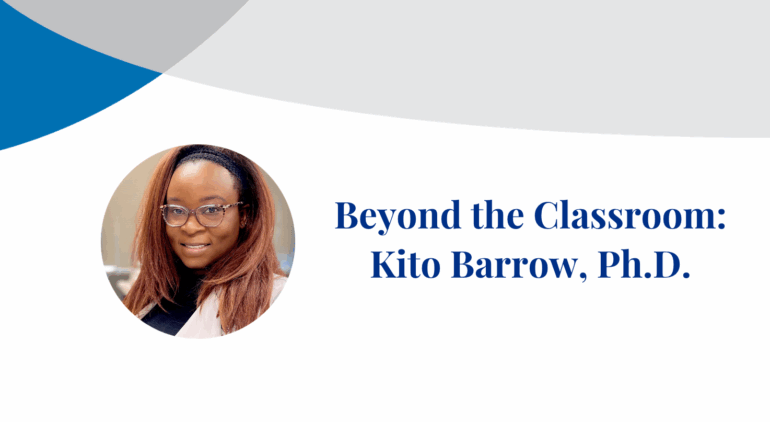BY ISABEL NELSON
The next generation of research scientists has unique challenges ahead of it, but those future researchers also have dedicated, driven instructors in their corner. Associate professor Kito Barrow, Ph.D., has a passion for research, something she is eager to inspire in her undergraduate students.
Born and raised in Barbados, Dr. Barrow moved to the United States for her college education, but her journey with science started earlier. Both of Dr. Barrow’s parents held science degrees, and she credits them with a lot of her confidence in male-dominated STEM spaces. Her sister, an environmental engineer, felt similarly uplifted.
“We had the importance of science ingrained in us from a young age,” Dr. Barrow says, “and it gave us the strength to say, ‘I’m going to do this work regardless of what you think.’” She moved to Texas, where she completed her B.S. in biology and M.S. in biotechnology. Her Ph.D. culminated in a dissertation focused on prostate cancer intervention.
When the institute where Dr. Barrow was teaching pharmacology became a part of The Chicago School, she also began teaching as an adjunct instructor in the M.S. Clinical Psychopharmacology program. Dr. Barrow’s introduction to a new playground for instruction and research only deepened her desire to expose undergraduate students to what science can be.
According to Dr. Barrow, when undergraduate students think of research, they often don’t think of their own lab work as being relevant. Limited funding in higher education often means undergraduates learn through closed-ended, rote experiments with limited applications—did you add the drops, and did the solution turn blue?—but that’s not representative of what real research looks like, Dr. Barrow says.
She wants to give students more chances to make an impact with their research. “You don’t have to have a Ph.D. to start,” Dr. Barrow says, “You just have to have an idea, then go for it.”
To that end, she and Jonathan Dodrill, Ph.D., dean of the College of Undergraduate Studies, have applied for a grant to expand the funding for biomedical research at The Chicago School. The funding would allow for the implementation of more CURE (Course-Based Undergraduate Research Experience) classes and offer opportunities for weekend residencies at on-ground campuses where students can do real research in their laboratories. “It’s one thing to do an experiment in your kitchen or to do a simulation online,” Dr. Barrow says, “but you can’t ever replace doing that in a real lab environment.”
Dr. Barrow wants her undergraduate students to know their voices matter. She believes an expansive approach to research, featuring voices from all walks of life, is critical for improving the field. “If we have a lot of different people working on something, maybe we will be able to fix something,” Dr. Barrow says. It’s why she’s excited to see how The Chicago School continues to grow. “There can always be better methods, more efficient ones,” she says. Successful research might take combining ideas from multiple places, but above all it will come down to a willingness to keep trying. It’s right there in the name, Dr. Barrow says: “You search, and then you do it again.”

